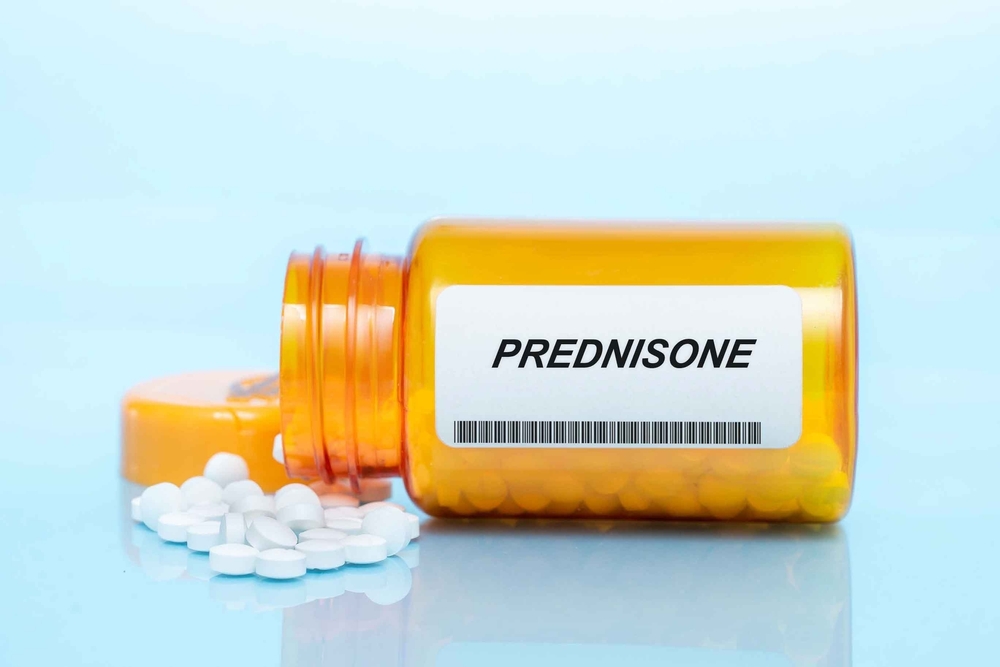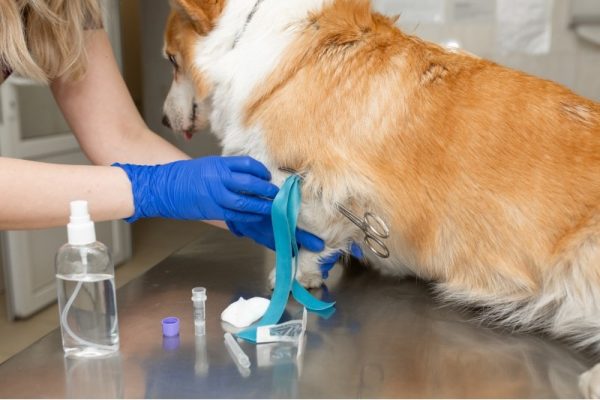In this article
Taking medication can influence our bodies—and that includes our canine counterparts. We can’t ever truly foretell how some medications will impact the body until administration. So, if your dog had an allergic reaction, inflammation, immune-mediated disease, or nervous system disorder, a vet might have prescribed a medication called prednisone.
Prednisone is known for having mild to moderate side effects, but used at higher doses or for longer periods these can be severe. If your dog is experiencing any negative effects, like weakness, be sure to communicate with a vet. In this article, we aim to explain more about the drug and what you can expect.

What Is Prednisone?
Prednisone is a common steroid used to treat a wide variety of inflammatory and reactive issues in the body. It is in a class of medications called corticosteroids. It can come in many forms, such as tablets, delayed-release tablets, liquid, injections, or concentrated solutions.
When used correctly, this drug is extremely beneficial to our doggy friends as well as human beings. It can help correct life-threatening diseases, settle extreme skin irritation, and make your dog more comfortable.

What Does Prednisone Do?
Depending on the underlying issue, prednisone can help with many types of inflammatory issues—from severe allergic reactions to central nervous system diseases, like granulomatous meningoencephalomyelitis.1 While it can have its fair share of side effects, it is often necessary when prescribed.
- Chronic itchiness
- Hives
- Inflammatory skin diseases
- Asthma
- Autoimmune diseases
- Endocrine disorders (Addison’s disease)
- Neoplasia
It can treat many more issues than our list, but this includes the most likely uses.
Weakness in Dogs Taking Prednisone
Weakness is a commonly reported side effect of prednisone. Usually, it only affects long-term users because it causes the muscle fibers to atrophy. This particular problem can be mild to severe, impacting each dog differently.
When this atrophying happens, it gains the title “steroid myopathy,” which can be chronic or acute. In humans it is typically reversible over a few months if the dose is reduced or the medication stopped. Generally, the visual cues that your dog might suffer from steroid myopathy include visible loss of muscle mass.
Besides muscle weakness, other side effects can cause your dog to appear weak or lethargic. Prednisolone suppresses the immune system, making your dog more susceptible to infections. One common scenario is developing an infection while using prednisolone.
In addition, if your dog experiences any of the side effects listed below, they might seem weak.
Call a Vet Immediately
Call a vet right away if your dog is experiencing weakness while taking prednisone. Side effects can be manageable sometimes, but if your dog is experiencing weak hind legs while taking prednisone, a vet will likely need to remove them from the medication and look for alternative options of treatment.
Did you know you can speak to a veterinarian without having to travel? Just head over to PangoVet. It's our online service where you can talk to a vet online and get the advice you need for your pet — all at an affordable price!

Other Side Effects of Prednisone
When taken short-term, prednisone will often have some side effects that aren’t too serious. However, when taken long term, it can cause a laundry list of ailments. Steroids should only be used long-term at the discretion of a vet, when the benefits outweigh the risks.
- Vomiting
- Lethargy
- Thirst
- Urinating more
- Increased appetite
- Panting
- Infections
- Weight gain
- Hair loss
- Thin skin
- Poor wound healing
- Calcium deposits in the skin
- Obesity
- Lipidemia
- Pancreatitis
- Elevated liver enzymes
- Secondary infections
- Diabetes mellitus
- Muscle weakness
- Digestive tract ulceration
- Iatrogenic cushing’s disease
It is crucial to keep an eye out for potentially dangerous side effects to keep your pet safe.
Testing for Medication Success or Failure
Any medication your dog takes has the potential to cause negative side effects. If you suspect that the medication might not be doing what you need it to or is causing other potentially concerning issues, your vet can run some tests to see how well the medication is working in the system.

Frequently Asked Questions
Should I Stop Giving My Dog Prednisone if They Show Signs of Muscle Weakness?
It’s not a good idea to just suddenly stop giving your dog prednisone if they show signs of muscle weakness without contacting a vet first. Prednisone needs to be gradually reduced in the body as when the medication is given the adrenal glands reduce their production of cortisol in response. The adrenal glands may need time to start producing their own cortisol again. If any removal of the medication happens, it should only be under direct professional guidance from a veterinarian.

Are There Alternative Medications to Prednisone a Vet Might Prescribe Instead?
If your dog doesn’t take prednisone well, a vet will need to look for alternatives. Other immunosuppressive medications like azathioprine or cyclosporine might be considered.
Are Certain Dogs More Likely to React Negatively to Corticosteroids Than Others?
There is currently no conclusive evidence that corticosteroid tolerance is less tolerated in certain breeds. However, certain contraindications exist such as existing Cushing’s disease/diabetes, gastric ulcers, and concurrent use of certain medications.


Conclusion
If your dog is experiencing muscle weakness, lethargy, or any concerning side effects after taking prednisone, please call a vet for further guidance. While side effects can be mild and temporary, it can also lead to long-term problems and be life-threatening in some cases. Weakness isn’t the only side effect to expect with prednisone. So, keep a lookout for anything else that might strike you as suspicious.
Featured Image Credit: Jaromir Chalabala, Shutterstock




















